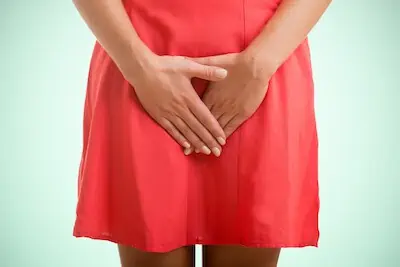Before your baby came into the picture, you and your spouse probably had lots of between-the-sheets fun. But now, when you finally have enough energy to go for it, it’s uncomfortable down there.
Why is this curse upon you?
Well, that’s one of the less-fun aspects of having a baby. Though please know it doesn’t last forever.
It’s very common for you to be less enthused about having sex at this time. After all, being awake at all hours of the night to nurse your baby means you’re not getting the sleep you need.
But another common thing is vaginal dryness. While it doesn’t happen to every woman, it happens to enough of them that it’s nothing you should worry about.
Still, it can make things very uncomfortable during sex. It can also just make you feel uncomfortable down there in general.
There’s a reason this is happening, so read on to find out more!
Does breastfeeding make you dry down there?
Yes, breastfeeding can make you dry down there. The reason? You can blame those hormones again.

The hormones estrogen and progesterone are responsible here. During a menstrual cycle, they can cause the buildup of the lining in your uterus. When a fertilized egg doesn’t implant, these hormone levels drop, and that lining sheds out, which you recognize as your period.
But during your pregnancy, these 2 hormones soar in levels. That uterine lining turns into the placenta, producing more estrogen and progesterone.
Then right after you give birth, those hormones drop dramatically in level. Within 24 hours after giving birth, they will be back at their pre-pregnancy levels. And if you’re breastfeeding, your body releases even less estrogen so as not to interfere with milk production.
Estrogen also has another role…it is crucial for sexual arousal since it boosts the blood flow to your vagina and primes it with that natural lubrication. When your estrogen levels are low, they can give you those not-so-fun symptoms – those night sweats, hot flashes, and, yes, vaginal dryness too.
Another possible cause could be postpartum thyroiditis. This happens when your thyroid is inflamed. This condition is marked by shakiness, irritability, weight gain, sensitivity to cold, dry skin, palpitations, and vaginal dryness.
While this condition isn’t all that common, you should talk to your doctor if you notice those other symptoms, along with vaginal dryness.
In any event, with your hormones going awry, vaginal dryness makes the tissue of your vagina thinner. It is also less elastic with this dryness and hence, more prone to injuries and tears. You may even feel burning and itching, which is caused by inflammation.
What helps vaginal dryness while breastfeeding?
I must tell you that I didn’t experience vaginal dryness after the birth of either of my daughters. After having 2 c-sections, I had to wait to get that all-clear from my doctor during the postpartum checkup.
Before that, I would not have even considered sex. My incision was tender, and I couldn’t imagine going at it during that time.
After the checkups, my husband was eager to resume fun time. Even though I wasn’t dry down there, it still hurt slightly. And that’s what struck me as funny simply because I didn’t push anything out of my vagina!

The inflammation of the area was what made it largely unpleasant. But as time went on, it felt normal and enjoyable again.
You don’t have to abstain after having a baby when breastfeeding makes your vagina as dry as the Sahara desert. There are a few things you can do until your hormones stabilize.
- Lube it up
Lubricants are great for sex in the postpartum phase. Make sure you are careful though… the petroleum-based ones can damage condoms. If your husband is wearing a condom so you don’t get pregnant immediately after having this baby (a wise choice!), you definitely need to read the ingredient list first.
- Try an estrogen cream
You can also use an estrogen vaginal cream, though I recommend you speak with your doctor about this first. Don’t just use one randomly.
- Or go with a vaginal moisturizer
Keeping things hydrated down there may help. A vaginal moisturizer can be applied every couple of days to balance things out.
- No douching
I’m not even sure WHY douche exists since every OB/GYN always says not to use them. If you have regularly used one, stop because it can agitate the sensitive tissues down there.
- Hydrate your whole body
You are a milk machine now, mama. That means you need to eat enough food and drink enough water to sustain your body as it goes through this phase. Make sure, especially, that you’re staying hydrated, as this can affect how dry it is in your vagina.
- Spice things up
I know that having a baby randomly crying in your home is a mood-killer. I know you want to be quick about things so you can at least have sex with your husband. However, your vagina may need more coddling than that quickie can give it.
A little more foreplay and perhaps a change-up on those positions may make it easier for things to slide right in if you get my drift.
And of course, talk to your doctor. I know it seems so embarrassing, but doctors know these things. If you are honest about what you are experiencing, they will be better able to help you.
Plus, sometimes dryness down there is caused by diabetes, infections, and other vaginal woes. There may be a reason behind it, especially if you’re not breastfeeding or have already stopped breastfeeding.
Will vaginal dryness go away after breastfeeding?
And here’s the best news of all…yes! Vaginal dryness doesn’t last forever. It usually improves once breastfeeding has finished. For many women who breastfeed beyond the first year, normal vaginal moisture tends to return when menstruation returns.
If you have any concerns about your vagina and the pain you may feel, it’s absolutely a discussion with your doctor. You don’t have to suffer, and it will return to normal again. In the meantime, try those tips to keep things comfortable down there!
Leslie Berry lives with her husband and two young daughters in Los Altos, California, where she loves helping other moms get comfortable with motherhood and embracing the insanity with facts peppered with laughs.
She loves eating too much sushi, exercising, and jamming out on her Fender. Read more about Leslie here.







